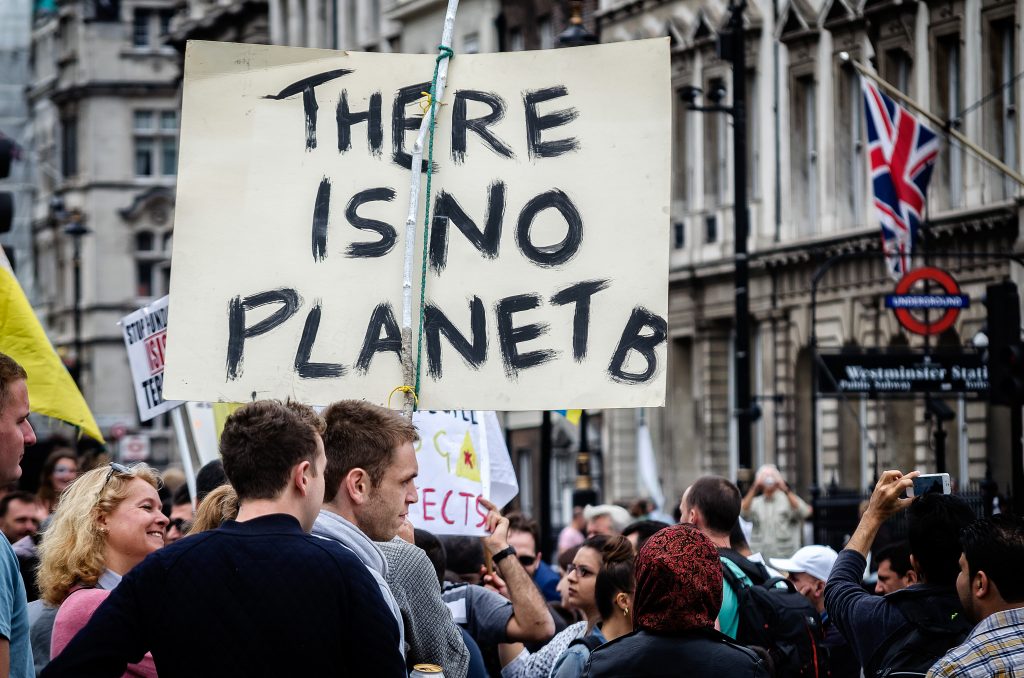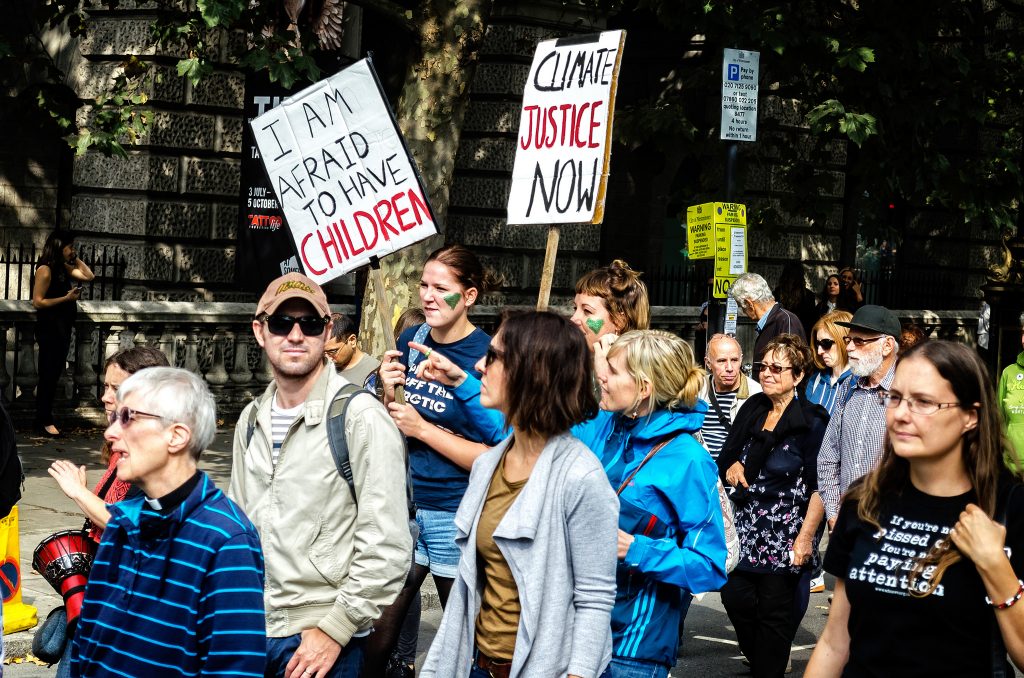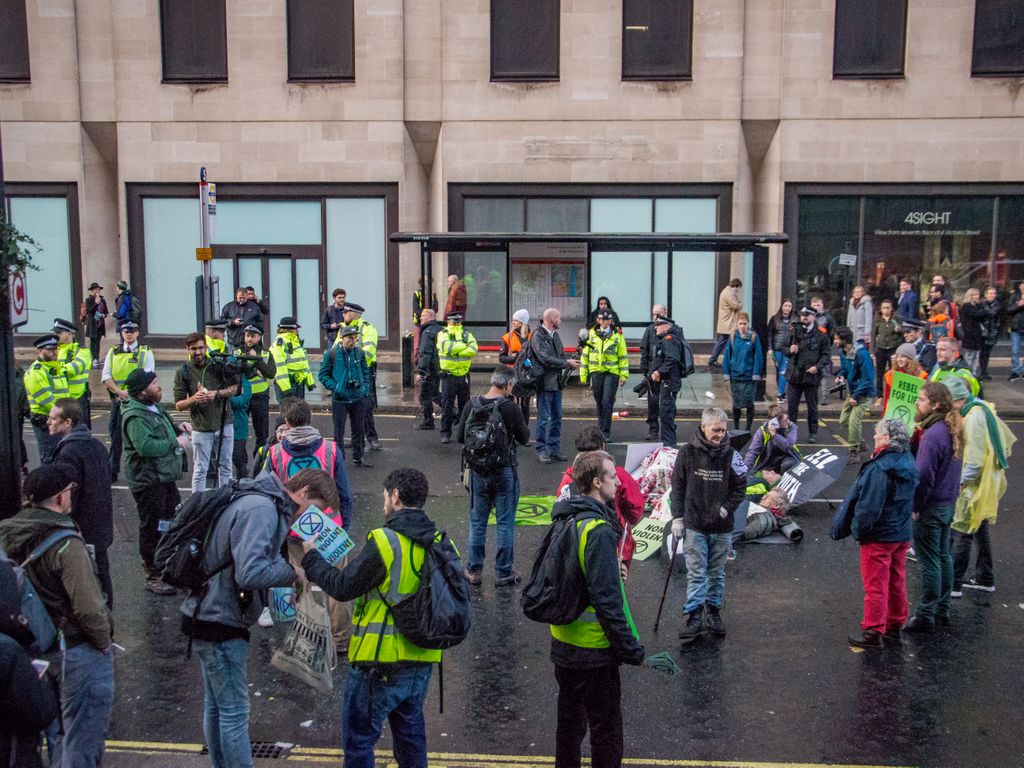Climate activists have blocked rush hour traffic in several central London locations in an attempt to bring the city to a standstill. The event is part of an escalating civil disobedience campaign that demands the government act to prevent a climate crisis.
Protesters from the group Extinction Rebellion targeted five busy junctions and bridges, forming strategic road blocks as commuters attempted to reach work on Wednesday. Activists threatened more “swarms” later in the day and throughout the week in the lead up to a mass protest on Saturday.
Forcing Action on Climate Change
 An earlier climate march in London. Garry Knight via flickr.
An earlier climate march in London. Garry Knight via flickr.
Extinction Rebellion has had an enormous impact on the capital since its inception a month ago, with thousands of people taking part in mass protests and co-ordinated direct actions. The protesters intend to peacefully disrupt the economy and the general public in order to force action on climate change. It is believed to be the largest civil disobedience campaign seen in the UK for decades.
The action on Wednesday took place on Lambeth and Vauxhall bridges in south London, as well as at Tower Bridge, Elephant and Castle and Earl’s Court. Protesters with banners and placards blocked traffic from 8am and handed flyers to motorists and passers-by.
The Guardian reported that some angry drivers shouted abuse but others, including many cyclists, said they backed the protests.
One angry passerby reportedly asked police why they could not clear the roadblock and was told that the activists had a right to protest.
What Rights Do Extinction Rebellion Activists Have?
#swarming is happening now at #Vauxhall #TowerBridge #EarlsCourt and #ElephantandCastle as part of @ExtinctionR’s escalating climate activism. You can join #RebellionSwarming tomorrow and Friday ahead of our next mass protest on Saturday. #Joinus #rebel #create #disrupt #climate pic.twitter.com/pjNu3dcUp0
— Tamsin Omond (@tamsinomond) November 21, 2018
The right to protest falls under Article 11 of the Human Rights Convention, the right to free association, which protects the right of a group to take collective action and the right to freedom of assembly.
It also protects the ability of people to come together and collectively express, promote, pursue, and defend their collective or shared ideas.
However, Article 11 is a ‘qualified right’, which means it can lawfully be interfered with in the interest of public safety, the prevention of disorder or crime, or the protection of other people’s rights and freedoms.
The right to protest also involves Article 10 of the Human Rights Convention, which protects the right to free expression. This means we can have our own opinions and share them with others, including publicly and as part of a group. Article 10 is also a qualified right, and can be restricted in certain circumstances.
It states: “Everyone has the right to freedom of expression. This right shall include freedom to hold opinions, and to receive and impart information without interference by public authority and regardless of frontier.”
The Human Rights Act 1998 marked the first time in English law that the right to protest was explicitly protected.
Civil Disobedience Campaigns Gaining Momentum
 An earlier climate march in London. Garry Knight via flickr.
An earlier climate march in London. Garry Knight via flickr.
Extinction Rebellion believes civil disobedience tactics have become necessary because the government is refusing to treat threats of climate breakdown and the extinction of humans and other animals as the crises they are.
The group has been inspired by mass disobedience and direct action movements in both Britain and the rest of the world. These movements include the suffragettes, the battle for civil rights in America, the fight to end Apartheid in South Africa and the non-violent Indian independence movement.
So far the group seems to be gaining momentum, with more activists willing to be arrested for a cause they believe is vital. But some fear the group could face burn-out and say their tactics are simply unsustainable.
Indeed arrests are totting up as the campaign continues, with 82 protesters arrested for occupying Southwark, Blackfriars, Waterloo, Westminster and Lambeth Bridges on Saturday 17 November. More than 60 protesters were taken away by police for acts of civil disobedience in the previous fortnight. Most of those arrested have been released without charge, with many going on to take part in subsequent actions, where they have been arrested again.







